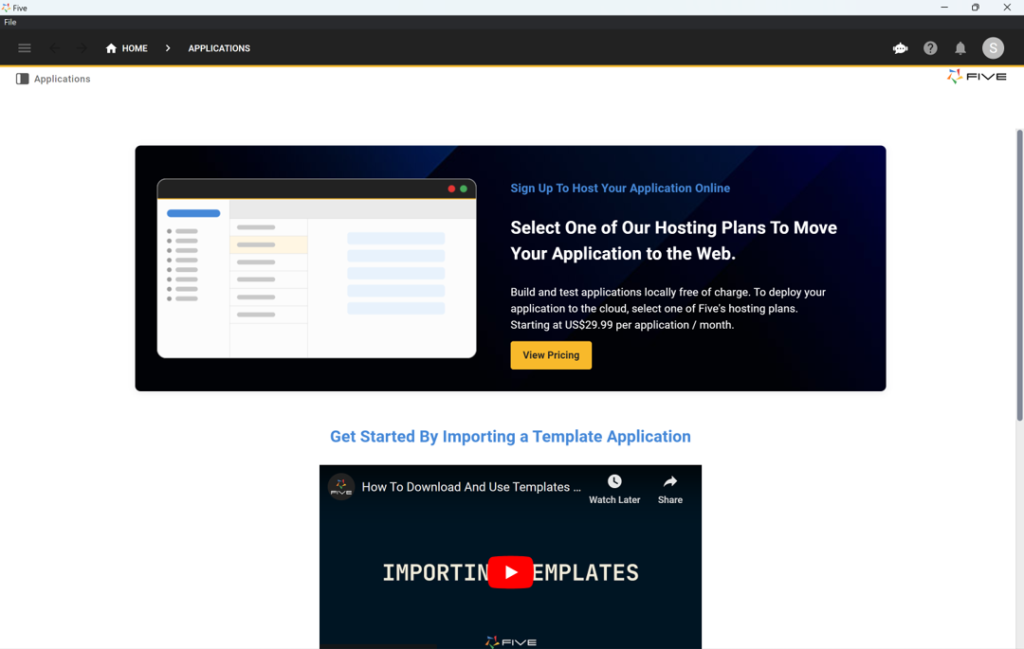Create an E-commerce Portal In 3 Steps
Create an E-commerce Portal: Quick & Easy Guide
An e-commerce portal is a web-based platform that provides businesses with a centralized system to manage their online store operations, including product inventory, order processing, customer management, and analytics.
E-commerce portals centralize important services and information, such as product listings, inventory levels, order history, and customer support, all in one place, making it easier for businesses to manage their online sales and streamline their operations.
However, creating an e-commerce portal can be challenging, especially if you don’t have technical coding knowledge.
That’s where portal builders like Five come into play, making it easier to develop and deploy customized e-commerce portals without extensive coding expertise.
Why Do You Need an E-commerce Portal?
An e-commerce portal provides businesses with a centralized platform to manage their online store’s operations. This includes overseeing product inventory, processing orders, managing customer relationships, and generating sales reports.
From tracking inventory levels, updating product listings, managing customer inquiries, or processing returns, an e-commerce portal streamlines business operations, making it easier for businesses to manage their online presence.
For administrators and retail professionals, the benefits are just as significant.
An e-commerce portal reduces the administrative burden by automating tasks such as order processing, inventory updates, and customer communication. This not only saves time but also minimizes errors and ensures that all product data is organized and easily accessible.
Admins can also use the portal to monitor sales performance, manage promotional campaigns, and maintain customer databases, all from one platform.
Components of Your E-commerce Portal
When building your e-commerce portal, you likely have some key features in mind, but there are a few essential components you might not have considered.
Firstly, a robust product management system is crucial for helping businesses manage their inventory and product listings efficiently. This can include tools for updating product information, tracking stock levels, and managing categories, ensuring that your store is always up to date.
Next, a user-friendly dashboard is essential for displaying relevant business data, such as sales summaries, order statuses, and quick links to important resources. This dashboard should also include tools for managing customer details, tracking shipments, and accessing support.
A backend database, such as MySQL, PostgreSQL, or MongoDB, is necessary for storing product data, customer information, and other critical details. If managing a database seems daunting, tools like Five can simplify the process, making it easier to transition from a database to a fully functional e-commerce portal.
Additionally, incorporating security features such as encryption, two-factor authentication, and secure data storage is crucial for protecting sensitive business information. Advanced security features can set your portal apart by ensuring that business and customer data is protected at all times.
By including these components, you can create an e-commerce portal that not only meets your business needs but also enhances the overall operational efficiency, making it a valuable tool for both users and administrators.
Build or Buy Your E-commerce Portal
When it comes to implementing an e-commerce portal, businesses face a critical decision: should you build a custom solution or buy an off-the-shelf product?
If you build one using tools like Five, you can develop exactly what you need without unnecessary features that add complexity. This allows you to tailor the portal to your business’s specific requirements, ensuring a solution that fits perfectly with your existing processes and retail needs.
Building a custom e-commerce portal also means you can integrate it with your existing IT infrastructure, providing a seamless experience across all your systems. This ensures compatibility with your CRM, inventory management software, and other tools, allowing you to work efficiently without the constraints of third-party platforms.
Having control over your data is another significant benefit. With a custom-built portal, you retain full control over product data, customer information, and transaction records, ensuring that sensitive information is protected. In contrast, off-the-shelf solutions may expose your data to third parties, posing potential security risks and limiting your control over your digital assets.
Building a secure e-commerce portal becomes much more manageable with Five. Five offers several advantages: it accelerates the portal development process, requires minimal coding knowledge, is more cost-effective than hiring a developer, and allows you to customize your portal to meet your business’s unique needs.
In the long run, building a custom solution can also be more cost-effective. The licensing fees for off-the-shelf e-commerce platforms can quickly add up, with many solutions costing thousands of dollars annually.
Given the significant costs and potential limitations associated with many off-the-shelf solutions, this further supports the case for building a custom solution, especially for businesses with specific needs or those looking for greater control over their digital infrastructure.
Creating an E-commerce Portal Can Be Easy

Building e-commerce portals used to be a daunting task, requiring extensive coding knowledge and leading many businesses to hire “expert developers” who often delivered subpar results.
Fortunately, times have changed, and creating e-commerce portals is now much easier with rapid portal builders like Five. These tools simplify the process, making it quicker and more accessible.
With Five, you no longer need to learn complex coding frameworks or spend hours researching expensive off-the-shelf solutions with high licensing fees. Instead, you can get started right away and have your e-commerce portal built and running in a single afternoon.
While there may be a slight learning curve, this approach is objectively better than traditional methods.
With Five, you can:
- Set up your web interface in minutes: Create a fully functional, custom e-commerce portal without needing extensive coding knowledge.
- Create a user-friendly, login-protected web interface: Ensure that only authorized users can access sensitive business data, enhancing security.
- Easily import your existing data: Get started quickly by importing your current product records and customer information, making the transition smooth and efficient.
Get free access to Five here and start building your e-commerce portal today.
How to Create an E-commerce Portal with Five
If building your e-commerce portal with Five sounds intriguing, here’s a quick guide to get you started.
Step 1: Access Five
If you haven’t already, sign up for free access to Five. Five offers a 14-day free trial with no credit card required. Depending on your project’s complexity and data storage needs, you may need to upgrade to a paid plan later.

Step 2: List Out Portal Attributes
Start by compiling a comprehensive list of all the attributes relevant to your e-commerce portal. Consider what matters most to your business: product management, order tracking, customer profiles, and more. Your e-commerce portal should serve as a “single source of truth,” so make sure it’s as complete as possible.
Here are some essential attributes typically included in an e-commerce portal system:
- User authentication and profile management
- Product management with detailed attributes (pricing, stock levels, etc.)
- Customer profiles with purchase history
- Order tracking and documentation
- Integrated inventory management tools
- Reporting and analytics tools
Follow our YouTube tutorial on developing a membership application, which shares many similarities with an e-commerce portal. This seven-step guide covers everything from database modeling to previewing your completed application. The first tutorial step explains how to create a database table in Five.
This four-and-a-half-minute video is highly recommended if your primary goal is developing an e-commerce portal.
The video also demonstrates how to assign different SQL data types to your table fields and visually inspect your database schema using Five’s database modeler. Additionally, it shows how Five automatically adds primary keys to all your tables.
Step 3: Launch Your E-commerce Portal Online
Once your e-commerce portal database is ready and well-structured, you can begin populating it with the necessary data.
Using Five, you can easily upload CSV files directly into your database. Ensure that the columns in your CSV align with the fields in your database, and import the data into your database tables.
Additionally, you can create a user-friendly, web-based graphical user interface with Five. This interface can feature forms for adding or editing product details, charts for visualizing sales trends, and the ability to generate PDF reports, such as order summaries or inventory reports, using data from the database.
When you’re ready to deploy your e-commerce portal, sign up for one of our paid plans, starting at just $29.99 per month per application. This plan includes unlimited end-users and provides you with a custom URL to access the portal online.
For more detailed guidance, check out one of our step-by-step code-along guides.
Conclusion: Building an E-commerce Portal
A well-designed e-commerce portal is essential for businesses managing a growing inventory and customer base. With tools like Five, creating a custom e-commerce portal has become more accessible than ever.
No longer do businesses need to settle for one-size-fits-all solutions. Instead, they can rapidly build and deploy an e-commerce portal that truly meets their operational needs.
Get free access to Five here and start building your e-commerce portal today.


